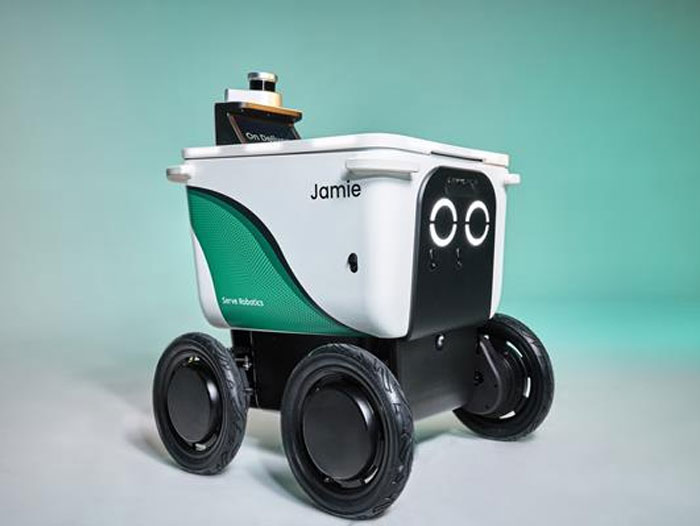Serve Robotics Rolls Out Third-Generation Autonomous Delivery Robot; Platform Upgrade Will Support National Scaling
November 5, 2024 | 4 min to read
Serve Robotics Inc. recently introduced its third-generation autonomous delivery robot, which features enhanced capabilities and reduced manufacturing costs, with 2,000 units set to deploy via the Uber Eats platform in 2025. These robots can carry more goods, travel faster and further, and offer improved safety measures. The upgraded models leverage AI advancements and superior hardware to ensure efficient deliveries, marking a significant milestone in Serve's mission to dominate the autonomous delivery market.

SAN FRANCISCO — Serve Robotics Inc. (“Serve”) (Nasdaq: SERV), a leading autonomous sidewalk delivery company, unveiled its third-generation autonomous delivery robot. The new model boasts significantly enhanced capabilities, achieved at substantially reduced manufacturing cost. The third-generation robot has entered manufacturing and 2,000 new units are on track to be deployed in 2025 on the Uber Eats platform across multiple U.S. markets.
Serve’s third-generation robots are designed to carry more goods, enable more deliveries, and further reduce the cost of delivery. They can move roughly twice as fast, travel approximately twice as far on a single charge, and spend 6 more hours in the field each day. Serve robots’ intelligence and autonomy are significantly advanced by the addition of Nvidia’s Jetson Orin module with 5x more on-board computing power, Ouster’s new REV7 digital lidar, and major upgrades to the robots’ sensor suite. These hardware advancements enable third-generation robots to deploy Serve’s newest and most powerful AI model architecture, embed new AI capabilities, and execute autonomous navigation decisions faster.
The third-generation robots also enjoy an expanded cargo bin that holds four large 16-inch pizzas or 15% more volume than the previous robots. Their new drivetrain is equipped with suspension to drive smoother and faster while protecting food quality, and their improved water resistance expands the robots’ ability to maneuver confidently in a wider range of weather conditions.
Importantly, these hardware and software enhancements combine to extend Serve’s commitment to safety on the sidewalk. In addition to market-leading safety capabilities, including fail-safe mechanical braking and autonomous collision avoidance, the third-generation robots introduce enhanced emergency braking — stopping 40% more quickly.
“Producing a cutting-edge robot that can drive faster and further while running 5 times more AI and slashing costs by half is a true engineering feat. I am proud of what our team has accomplished with our third-generation robot, which represents the culmination of years of relentless effort. Our new robot puts Serve significantly down the cost curve and ahead of the competition as we roll out one of the largest autonomous fleets in the country in the coming months,” said Dr. Ali Kashani, CEO and co-founder of Serve Robotics.
“We are excited to have begun mass manufacturing of our third-generation robot in collaboration with Magna International. By utilizing a global supply chain and final assembly in North America, we have ensured exceptional quality and performance. Our rigorous engineering, validation, and testing processes have confirmed that this is the most rugged and high-performing robot we’ve ever created. Our cutting-edge robots will wheel into new cities and neighborhoods in 2025 and we can’t wait for users to experience their delivery capabilities first-hand,” said Euan Abraham, Chief Hardware & Manufacturing Officer of Serve Robotics.
In the coming months, Serve will deploy its newest robots across Los Angeles and in one new metro market.
To learn more about Serve robotics, visit https://www.serverobotics.com/.
About Serve Robotics
Serve Robotics develops advanced, AI-powered, low-emissions sidewalk delivery robots that endeavor to make delivery sustainable and economical. Spun off from Uber in 2021 as an independent company, Serve has completed tens of thousands of deliveries for enterprise partners such as Uber Eats and 7-Eleven. Serve has scalable multi-year contracts, including a signed agreement to deploy up to 2,000 delivery robots on the Uber Eats platform across multiple U.S. markets.
For further information about Serve Robotics (Nasdaq:SERV), please visit www.serverobotics.com or follow us on social media via X (Twitter), Instagram, or LinkedIn @serverobotics.
Forward Looking Statements
This press release contains forward-looking statements within the meaning of the Private Securities Litigation Reform Act of 1995. Serve intends such forward-looking statements to be covered by the safe harbor provisions for forward-looking statements contained in Section 21E of the Exchange Act. These forward-looking statements can be about future events, including statements regarding Serve’s intentions, objectives, plans, expectations, assumptions and beliefs about future events, including Serve’s expectations with respect to the financial and operating performance of its business, its capital position, and future growth. The words “anticipate”, “believe”, “expect”, “project”, “predict”, “will”, “forecast”, “estimate”, “likely”, “intend”, “outlook”, “should”, “could”, “may”, “target”, “plan” and other similar expressions can generally be used to identify forward-looking statements. Indications of, and guidance or outlook on, future earnings or financial position, performance, or capabilities of our robots are also forward-looking statements. Any forward-looking statements in this press release are based on management’s current expectations of future events and are subject to a number of risks and uncertainties that could cause actual results to differ materially and adversely from those set forth in or implied by such forward-looking statements. Risks that contribute to the uncertain nature of the forward-looking statements include those risks and uncertainties set forth in Serve’s Annual Report on Form 10-K for the year ended December 31, 2023, filed with the United States Securities and Exchange Commission (the “SEC”) and in its subsequent filings filed with the SEC. All forward-looking statements contained in this press release speak only as of the date on which they were made. Serve undertakes no obligation to update such statements to reflect events that occur or circumstances that exist after the date on which they were made.
